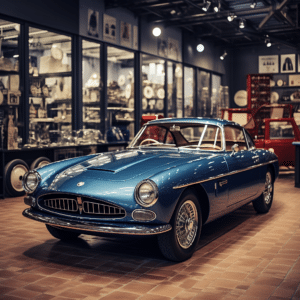
Mastering Classic Car Research: Your Ultimate Buying Guide
Buying a classic car? It’s a big decision! With lots of options, it’s vital to be informed. Here, we’ll check out the steps to research and buy a classic car.
- First, figure out your budget and what’s important to you. Classic cars come in all shapes, sizes, and prices. Knowing your spending limit and what features matter can help you narrow your choices.
- Second, find out as much as you can about the make and model you’re interested in. Check online forums for classic cars. Enthusiasts share knowledge and experiences there. Their advice can be useful for common issues, maintenance costs, and potential problems.
- Third, inspect the car before you commit. Test drive it if possible. Get a mechanic to check it for hidden issues. Small details can affect the value and pleasure of owning a classic car.
Now, here’s a story. A friend of mine saw a Chevy Camaro at an auction and fell in love. Without research or inspection, he bought the car at a high price. But it had mechanical problems that weren’t disclosed. He learned the hard way how important research is before buying a classic car.

Researching Classic Cars
Researching classic cars is a must for buyers! Doing so will help you make an informed decision. Here’s a table to guide you:
| Aspect | Description |
|---|---|
| Vehicle History | Check for any accidents, repairs, or changes. |
| Maintenance Record | See how well the car has been maintained. |
| Rarity | Check how many models exist and their rarity. |
| Market Value | See the current market value. |
| Authenticity | Look for originality with VIN, documents, and numbers. |
Also, investigate each model’s strengths and weaknesses, parts availability, and maintenance costs. Get advice from experts or enthusiasts for info not found online.
Researching is essential – it’ll save you from pitfalls and help you find the perfect car. Enjoy the hunt!
Finding Reliable Sources
Researching a classic car is important. Sources can give accurate info to help buyers decide. A table gives details of reliable sources. Plus, mechanics, expos and dealerships offer unique info.
Here’s how to use these sources:
- Join classic car clubs. Get advice and access resources.
- Use online forums. Ask questions and get insights.
- Read expert publications. Get articles on owning classic cars.
- Consult expert opinions. Check condition and restoration costs.
By exploring reliable sources, buyers can make the right choice and maximize their classic car enjoyment.
Consulting Experts
Experts can offer insight on classic car authenticity and condition. They know what to look for that may not be obvious to an inexperienced buyer. Furthermore, experts can provide advice on a car’s value and market trends. This is great for negotiating a fair price and making a wise investment. Finally, experts can recommend trustworthy sellers and refer buyers to dependable restoration services. Their industry contacts open up beneficial resources for enthusiasts.
Experts provide access to info not found from general online research or personal knowledge. They can share details on a model’s history, giving a deeper understanding of the classic car market. For instance, did you know that according to CCCA, full classics must meet certain criteria to be considered? This includes being built between 1915 – 1948, to guarantee only the best vehicles are labelled as true classics.
Making Informed Decisions
Making wise decisions when buying a classic car is essential. It helps guarantee the right choice and invest your money smartly. To help you, here is a table with key points to think about before buying:
| Factor | Description |
|---|---|
| Vehicle condition | Check the car’s general state, including interior and exterior, engine performance, and any signs of repair or restoration. |
| Documentation | Ensure the car has right papers, like maintenance records, ownership history, and original manuals. |
| Rarity | See how rare the model is, and how it affects its value. |
| Authenticity | Confirm there are no modifications or aftermarket parts. |
Also, it’s important to consider special details related to classic cars’ buying.
Classic cars come with a unique story—stories of memorable trips, famous drivers, or even big events. Learning these stories helps buyers bond with their potential purchase.
In 1987, an amazing classic car was discovered in a forgotten barn. The 1957 Chevrolet Bel Air had been untouched for years but still kept its original beauty and features. This incredible find shows the excitement that can come with informed decisions when looking for classic vehicles.
Keep in mind, researching before buying a classic car ensures not just a smart investment, but also a chance to own a part of automotive history that speaks to your personal passion.
Finalizing the Purchase
Ready to buy a classic car? Here’s what to do:
- Examine the car inside and out. Look for rust, damages, and mechanical issues. Make sure the VIN numbers match.
- Take it for a test drive. Test its performance, sounds, and components like brakes, steering, and lights.
- Check the paperwork. Verify ownership history, maintenance records, and title documents.
- Get an expert to inspect. Hire a mechanic or appraiser to uncover hidden issues.
- Negotiate and finalize the price. Use market value and condition knowledge for a fair transaction.
Keep talking with the seller. It builds trust and helps get a good deal. Check each step off this list. It’ll ensure a reliable classic car you can enjoy for years.

Conclusion
Doing research is key to a wise classic car purchase. Factors like condition, history, and market value should be taken into account. Plus, being passionate about the car you choose brings joy and fulfillment.
- Gather info on your make and model. Get details on production years, mechanics, quirks, and owner/expert reviews.
- Inspect the car in person. Check exterior & interior for wear and damage. Ask for docs on maintenance, repairs, and restorations.
- Consult an experienced classic car mechanic or appraiser. They have the expertise to assess mechanical components and structural integrity. This may uncover hidden issues.
Informed decision-making and love for vintage automobiles should be balanced. This will match your individual preferences and financial capabilities.
Classic car shows and auctions can offer learning opportunities, and networking in the community can provide access to resources and potential leads.
Pro Tip: Don’t buy a classic car without due diligence. Take your time and do thorough research. It’ll be worth it!
Frequently Asked Questions
Q: Where can I find reliable information about classic cars?
A: You can find reliable information about classic cars through reputable online resources, enthusiast forums, and specialized magazines. It’s also helpful to consult with knowledgeable experts and attend classic car events.
Q: What are the key factors to consider when researching a classic car?
A: Key factors to consider when researching a classic car include its make, model, year, condition, rarity, market demand, and historical significance. It’s important to thoroughly examine documentation, maintenance records, and ownership history.
Q: How do I determine the value of a classic car?
A: Determining the value of a classic car involves analyzing its condition, originality, rarity, level of restoration, market demand, and current trends. Consulting price guides, appraisers, and comparing recent sale prices of similar cars can also provide valuable insights.
Q: What precautions should I take when buying a classic car online?
A: When buying a classic car online, it’s crucial to verify the seller’s credibility, request detailed photos and videos of the car, insist on a pre-purchase inspection by a trusted mechanic, review the terms of sale, and securely transfer funds through trusted platforms.
Q: Is it necessary to join a classic car club or organization?
A: Joining a classic car club or organization can be highly beneficial, as it provides access to a community of knowledgeable enthusiasts who can offer guidance, advice, and valuable resources. Club membership can also provide opportunities to participate in events and network with other collectors.
Q: Should I consider hiring a professional to assist with my classic car research?
A: Hiring a professional, such as a classic car appraiser or consultant, can be advantageous, particularly if you’re new to the world of classic cars. Professionals have expertise in evaluating authenticity, market value, and can provide guidance throughout the research and buying process.
